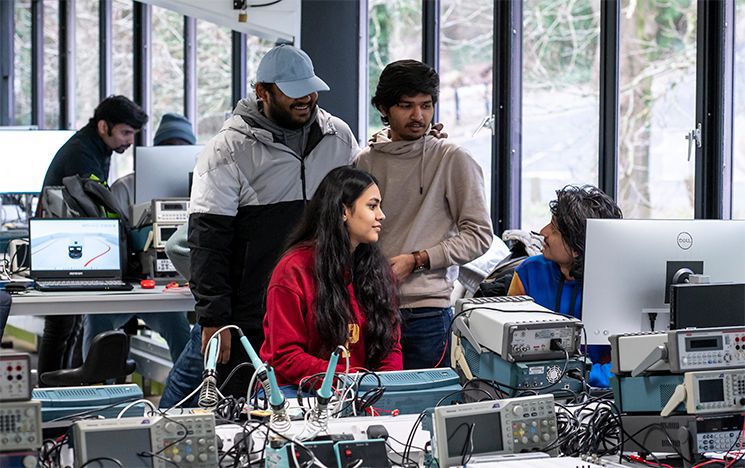Electronics labs
Learn about our electronics labs, including the Electronic Beta Bay and Power Electronics Lab.

About our Electrical and Electronics labs and facilities
We have a range of labs and facilities that our students use across courses in Electrical and Electronic Engineering, Mechanical Engineering and Automotive Engineering.
You’ll gain industry-relevant skills and experiences that meet the demands of today's engineering practices. You’ll use hardware and software solutions from National Instruments (NI), Texas Instruments, Quanser, Siemens, Mitsubishi and more.
We continue to maintain and develop to provide you with the best learning environment. Dedicated module convenors, teaching assistants and technicians are ready to support and enrich your learning journey.
Whether it’s troubleshooting technical challenges, providing guidance on experiments or facilitating hands-on activities, our team is committed to fostering your growth and success in mastering electronics.
Explore our labs:
- Electronics Lab
- Advanced Electronics Lab
- Electronic Beta Bay
- Power Electronics Lab
- Foundation Year Mechanical/Electrical Lab.
Electronics system design, sensing and prototyping Lab
This lab is used by undergraduate Electrical and Electronics, Robotics and Mechatronics Engineering students in Year 1 and 2.
You’ll discover the fascinating world of analogue circuits, mixed-signal signal analysis, electronic devices, system design, circuit prototyping and testing. You will start building basic analogue circuits using fundamental elements such as capacitors, resistors, inductors and transistors, studying their characteristics and limitations.
You’ll learn how to use electronics measurement equipment (such as oscilloscopes and function generators) to test your prototypes. You’ll further develop your electronic skills to build fully operational electronics systems. These will cover all the practical design considerations, from sensing to acquisition and actuation, which are key aspects required in an industrial and research setting.
In lab sessions, you’ll engage in practical activities that help you:
- demonstrate a sound knowledge of basic analogue and digital systems, interpret component specifications, application notes and datasheets
- apply circuit design concepts to a practical implementation, while learning how to prototype and test circuit designs using NI hardware
- build, simulate, test and evaluate a circuit to solve a challenge in the automotive and robotic industry
- identify different types of sensors and its output to develop suitable signal conditioning/conversion circuits to be coupled into data acquisition systems
- identify the acquisition parameters and setup industry-standard hardware from NI for a particular task.
The recently updated facilities include state-of-the-art equipment such as:
- 20 fully operational workstations with improved electronic antistatic workbenches and wiring
- NI ELVIS III boards
- NI Field programable gate arrays (FGBAs)
- NI myDAQs (data acquisition devices)
- NI Multisim simulation software
- NI LabVIEW programming sowftware
- oscilloscopes
- arbitrary function generators
- multimeters
- voltage preamplifiers
- electronic prototyping (soldering irons, antistatic mats, soldering extractors, consumables)
- benchtop power supplies.
Advanced electronics system design, sensing and prototyping Lab
This lab is used by Electrical and Electronics, Robotics and Mechatronics Engineering students in Year 3 and 4. This is an advanced version of the electronics lab with electronic equipment.
You’ll learn about the fascinating world of analogue and mixed-signal signal processing. You’ll build analogue systems using analogue ICs and study their macro models, characteristics and limitations.
In lab sessions, you’ll take part in practical activities that help you understand the internal operation of analogue integrated circuits.
The recently updated facilities include state-of-the-art equipment like:
- 15 fully operational workstations with improved electronic antistatic workbenches and wiring
- Texas Instrumets Analogue electronics Lab
- NI Field programable gate arrays (FGBAs)
- NI myDAQs (data acquisition devices)
- NI Multisim simulation software
- NI LabVIEW programming software
- oscilloscopes
- arbitrary function generators
- multimeters
- voltage preamplifiers
- electronic prototyping (soldering irons, antistatic mats, soldering extractors, consumables)
- benchtop power supplies.
Extra optional sessions and equipment loans give you the chance to develop your hands-on experience. Through this you can also improve health and safety awareness and gain experimental learning skills that are valuable in industry.
We also offer one-to-one technical advice for electronics-based coursework and projects, to support your learning and improve your technical skills.
Electronic Beta Bay
The Beta Bay is available for all our Electrical Engineering students as well as Mechanical Engineering with Robotics.
This area has been equipped with a brand-new Beta tool bay, as well as new soldering irons, power supplies and oscilloscopes.
Students use this area to collect data for their final-year projects.
Power Electronics Lab
The Power Electronics Lab is used at a basic level by all first-year Engineering students. Second and third-year Electrical Engineering students will wire their own rigs, automatically load the dyno/motor sets and programme the machines.
This lab has been recently updated to include brand-new power electronic equipment. This includes x9 dynamometer and 300W motor sets.
It’s also equipped with new fault finder simulators, inductive loads, capacitive loads and programmable frequency controllers.
In this lab you’ll learn about:
- the efficiencies of motors, motor and generator testing
- the relationships between different electrical and mechanical properties
- the characteristics of different types of motors
- how to use MATLAB to simulate the motors and their characteristics.
Foundation Year Mechanical/Electrical Lab
We have a specialist area for Foundation Year Engineering students.
You’ll learn about mechanical experiments (such as the moment of inertia and Hooke’s law experiment) and electronics work (including operational amplifiers, programmable logic boards, breadboarding and programming Arduinos).